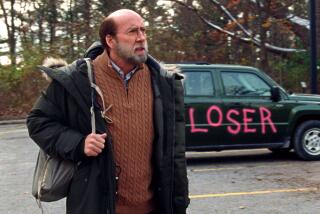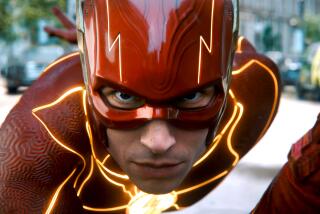America’s dance with a devil
- Share via
IN THE RECENT film “Lord of War,” Nicolas Cage plays a Russian emigre and a gunrunner. Cage’s Yuri Orlov isn’t exactly immoral, even when he is giving a West African dictator boatloads of AK-47s to wax many people in his country, not to mention many more in diamond-rich Sierra Leone. Yuri just happens to have a single talent: providing weaponry to speed along the disintegration of the world order.
The film’s most memorable character is the dictator, obviously based on former Liberian President Charles Taylor, who is facing extradition by an international war crimes court. Both Taylor and his fictional counterpart were educated in the United States and use outdated American idioms.
Taylor has a long relationship with the United States. After studying at Bentley College outside Boston, he returned to Liberia, only to flee after being accused of embezzling $900,000 from the government. The U.S. detained him at a Massachusetts prison while he awaited extradition, but he escaped, reportedly with the aid of a rope made of bedsheets. Taylor himself has suggested that the CIA helped with his escape. At the time, the Reagan administration was having second thoughts about its support of Liberia’s dictator, Samuel K. Doe.
Taylor came up with an inspired plan for Liberia. When he failed to win the presidency, he gained control of the country’s timber and rubber, which he sold off to foreign concerns. By the mid-1990s, Taylor was waging a full-tilt civil war. His revenues were estimated at between $75 million to $100 million a year, while the government was earning little more than $17 million.
Taylor also backed rebels in neighboring Sierra Leone to gain control of its diamond mines. By the time he became president of Liberia in 1997, he had become the ultimate West African big man. He prolonged a civil war that killed as many as 200,000 people and drove about a quarter of Liberians from their homes. His backing of the rebel group Revolutionary United Front resulted in another 50,000 dead in Sierra Leone and 10,000 people who are now minus hands or feet because they were lopped off by Taylor-backed rebels.
Taylor was forced from office in 2003. He found asylum in Nigeria, where President Olusegun Obasanjo insists that he will not allow Taylor to be extradited unless the Liberian government demands it. But at the moment, that seems unlikely because Taylor still wields influence in Liberia, despite this month’s election of a former United Nations official, reformer Ellen Johnson-Sirleaf, as president.
A trial for Taylor is not merely about punishing one man. International justice is in a tenuous position these days, with a number of countries reluctant to fund war-crimes courts that are expensive and slow. To counter those criticisms, a tribunal handling charges arising from the Sierra Leone conflict is working under a strict deadline. Court officials say Taylor must be delivered to stand trial by the end of the year.
Congress and the U.N. Security Council have called for Taylor to stand trial. The Bush administration, however, has not pushed aggressively for his extradition.
Why? Africa-watchers suggest that the United States has much to fear if Taylor takes the witness stand. He might reveal not only his many ties to the U.S. and its support for his regime over the years, but also the failure of the U.S. to act on warnings about his ties to Al Qaeda, which date to well before 9/11.
David Crane, a lawyer and former Army paratrooper who oversaw creation of the Sierra Leone war-crimes court, says the administration’s attitude toward Taylor’s trial changed in April, when investigators made public their findings about Taylor’s links to Al Qaeda.
Letting Taylor skate would send a bad signal not only to terrorists but to people everywhere about democracy and the rule of law. It also would give tacit approval to the destructive notion that noncombatants are fair game in war as long as the bottom line stays intact. That’s the message we get at the end of “Lord of War.”
If you haven’t seen the movie and intend to, stop reading now. Not that the conclusion should surprise anyone. When Yuri’s winning streak finally runs out, he is busted by an Interpol agent. In a Manhattan interrogation room, Yuri announces that the phone is about to ring. The caller, he says, will be a man from the U.S. government who will order his release. The gunrunner, it seems, has served American interests.
The phone rings.
The Interpol agent grimaces.
Yuri is soon back on a Manhattan sidewalk, ready for the next deal.
More to Read
Only good movies
Get the Indie Focus newsletter, Mark Olsen's weekly guide to the world of cinema.
You may occasionally receive promotional content from the Los Angeles Times.










